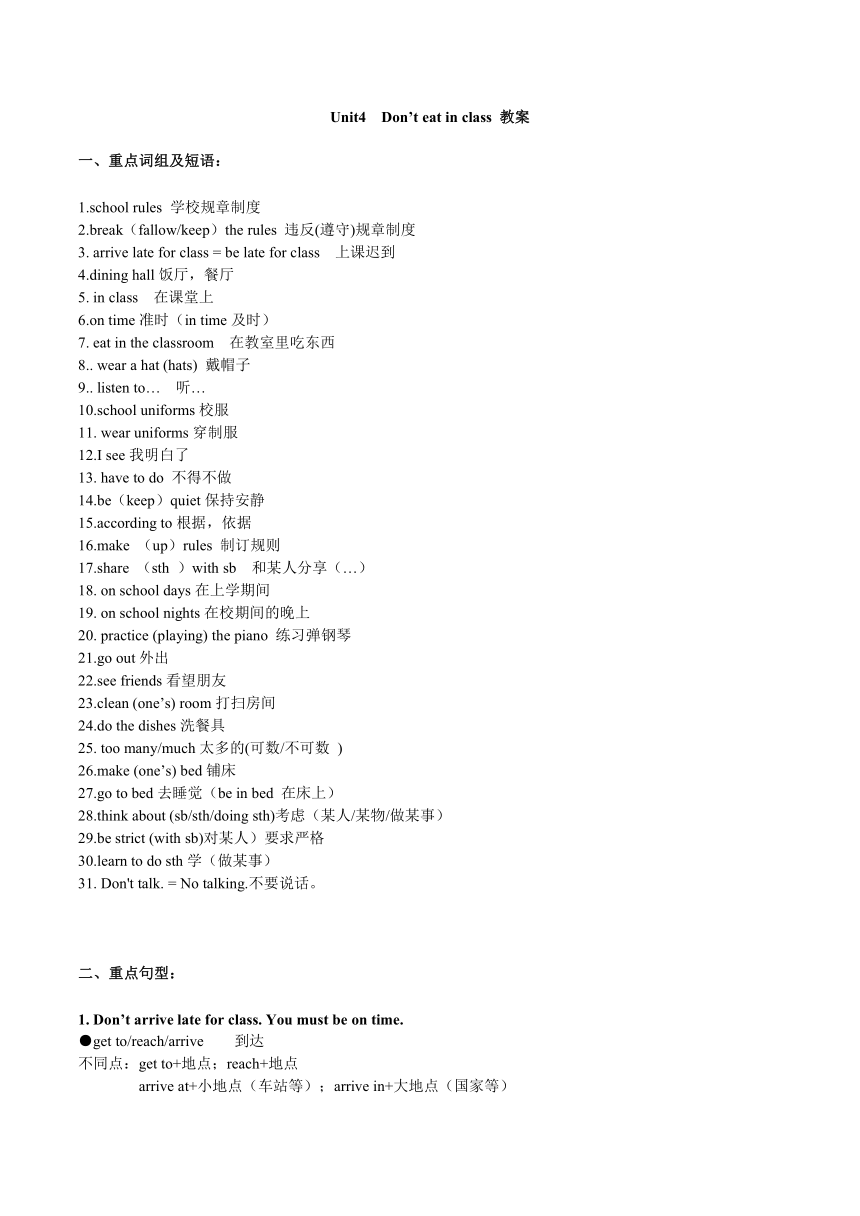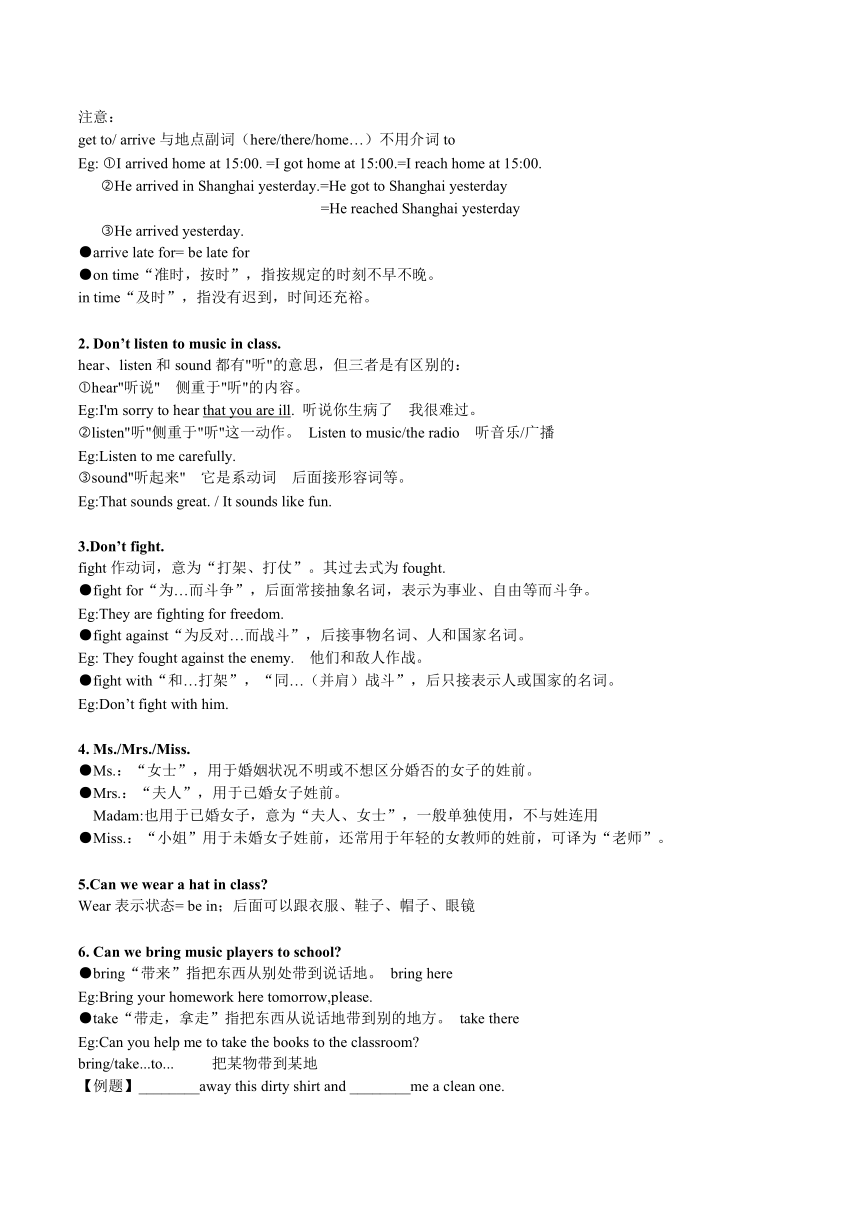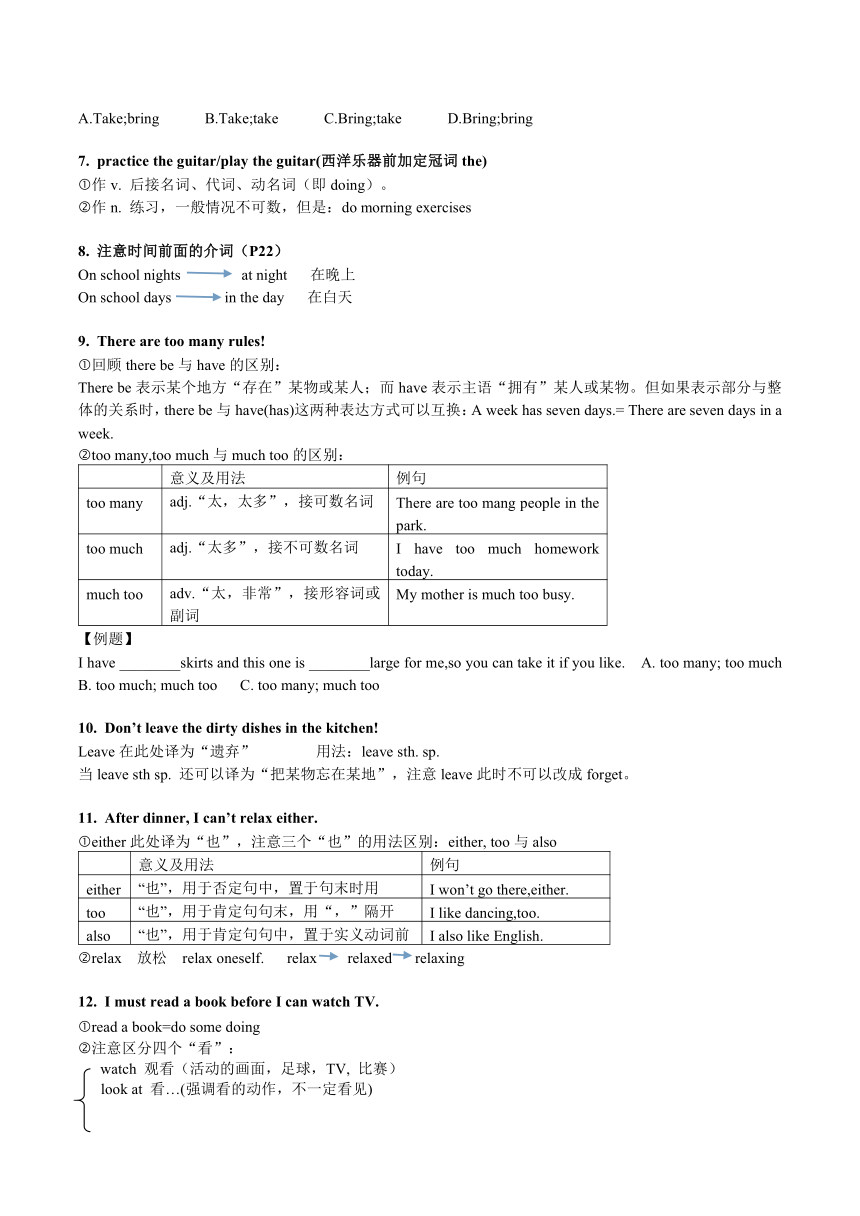Unit4 Don’t eat in class. 知识点归纳
文档属性
| 名称 | Unit4 Don’t eat in class. 知识点归纳 |  | |
| 格式 | zip | ||
| 文件大小 | 22.9KB | ||
| 资源类型 | 教案 | ||
| 版本资源 | 人教新目标(Go for it)版 | ||
| 科目 | 英语 | ||
| 更新时间 | 2016-03-01 15:36:59 | ||
图片预览



文档简介
Unit4 Don’t eat in class 教案
重点词组及短语:
1.school rules 学校规章制度
2.break(fallow/keep)the rules 违反(遵守)规章制度
3. arrive late for class = be late for class 上课迟到
4.dining hall饭厅,餐厅
5. in class 在课堂上
6.on time准时(in time及时)
7. eat in the classroom 在教室里吃东西
8.. wear a hat (hats) 戴帽子
9.. listen to… 听…
10.school uniforms校服
11. wear uniforms穿制服
12.I see我明白了
13. have to do 不得不做
14.be(keep)quiet保持安静
15.according to根据,依据
16.make (up)rules 制订规则
17.share (sth )with sb 和某人分享(…)
18. on school days在上学期间
19. on school nights在校期间的晚上
20. practice (playing) the piano 练习弹钢琴
21.go out外出
22.see friends看望朋友
23.clean (one’s) room打扫房间
24.do the dishes洗餐具
25. too many/much太多的(可数/不可数 )
26.make (one’s) bed铺床
27.go to bed去睡觉(be in bed 在床上)
28.think about (sb/sth/doing sth)考虑(某人/某物/做某事)
29.be strict (with sb)对某人)要求严格
30.learn to do sth学(做某事)
31. Don't talk. = No talking.不要说话。
二、重点句型:
1. Don’t arrive late for class. You must be on time.
●get to/reach/arrive 到达
不同点:get to+地点;reach+地点
arrive at+小地点(车站等);arrive in+大地点(国家等)
注意:
get to/ arrive与地点副词(here/there/home…)不用介词to
Eg: (I arrived home at 15:00. =I got home at 15:00.=I reach home at 15:00.
(He arrived in Shanghai yesterday.=He got to Shanghai yesterday
=He reached Shanghai yesterday
(He arrived yesterday.
●arrive late for= be late for
●on time“准时,按时”,指按规定的时刻不早不晚。
in time“及时”,指没有迟到,时间还充裕。
2. Don’t listen to music in class.
hear、listen和sound都有"听"的意思,但三者是有区别的: ?
(hear"听说"?侧重于"听"的内容。
Eg:I'm sorry to hear that you are ill. 听说你生病了?我很难过。
(listen"听"侧重于"听"这一动作。 Listen to music/the radio 听音乐/广播
Eg:Listen to me carefully.
(sound"听起来"?它是系动词?后面接形容词等。
Eg:That sounds great. / It sounds like fun.
3.Don’t fight.
fight作动词,意为“打架、打仗”。其过去式为fought.
●fight for“为…而斗争”,后面常接抽象名词,表示为事业、自由等而斗争。
Eg:They are fighting for freedom.
●fight against“为反对…而战斗”,后接事物名词、人和国家名词。
Eg: They fought against the enemy. 他们和敌人作战。
●fight with“和…打架”,“同…(并肩)战斗”,后只接表示人或国家的名词。
Eg:Don’t fight with him.
4. Ms./Mrs./Miss.
●Ms.:“女士”,用于婚姻状况不明或不想区分婚否的女子的姓前。
●Mrs.:“夫人”,用于已婚女子姓前。
Madam:也用于已婚女子,意为“夫人、女士”,一般单独使用,不与姓连用
●Miss.:“小姐”用于未婚女子姓前,还常用于年轻的女教师的姓前,可译为“老师”。
5.Can we wear a hat in class?
Wear表示状态= be in;后面可以跟衣服、鞋子、帽子、眼镜
6. Can we bring music players to school?
●bring“带来”指把东西从别处带到说话地。 bring here
Eg:Bring your homework here tomorrow,please.
●take“带走,拿走”指把东西从说话地带到别的地方。 take there
Eg:Can you help me to take the books to the classroom?
bring/take...to... 把某物带到某地
【例题】________away this dirty shirt and ________me a clean one.
A.Take;bring B.Take;take C.Bring;take D.Bring;bring
practice the guitar/play the guitar(西洋乐器前加定冠词the)
(作v. 后接名词、代词、动名词(即doing)。
(作n. 练习,一般情况不可数,但是:do morning exercises
注意时间前面的介词(P22)
On school nights at night 在晚上
On school days in the day 在白天
There are too many rules!
(回顾there be与have的区别:
There be表示某个地方“存在”某物或某人;而have表示主语“拥有”某人或某物。但如果表示部分与整体的关系时,there be与have(has)这两种表达方式可以互换:A week has seven days.= There are seven days in a week.
(too many,too much与much too的区别:
意义及用法
例句
too many
adj.“太,太多”,接可数名词
There are too mang people in the park.
too much
adj.“太多”,接不可数名词
I have too much homework today.
much too
adv.“太,非常”,接形容词或副词
My mother is much too busy.
【例题】
I have ________skirts and this one is ________large for me,so you can take it if you like. A. too many; too much B. too much; much too C. too many; much too
Don’t leave the dirty dishes in the kitchen!
Leave在此处译为“遗弃” 用法:leave sth. sp.
当leave sth sp. 还可以译为“把某物忘在某地”,注意leave此时不可以改成forget。
After dinner, I can’t relax either.
(either此处译为“也”,注意三个“也”的用法区别:either, too与also
意义及用法
例句
either
“也”,用于否定句中,置于句末时用
I won’t go there,either.
too
“也”,用于肯定句句末,用“,”隔开
I like dancing,too.
also
“也”,用于肯定句句中,置于实义动词前
I also like English.
(relax 放松 relax oneself. relax relaxed relaxing
I must read a book before I can watch TV.
(read a book=do some doing
(注意区分四个“看”:
watch 观看(活动的画面,足球,TV, 比赛)
look at 看…(强调看的动作,不一定看见)
see 看见 看到 (强调看的结果)
read 看(书、报)
I know how you feel.(回顾unit3的宾语从句,注意从句要使用陈述语序)
Parents and schools are sometimes strict, but remember, they make rules to help us.
sometimes ---------- 有时,时常,时而 some time -------- 一段时间 some times -------- 好几次,好几倍 sometime --------- (在)某个时刻,(在)某时间点 sometime in the future
(strict是形容词,意为 “严格的”; “严厉的”,通常与be动词连用。
be strict with sb “对某人严厉”
Eg:We should be strict with ourselves.
be strict in (doing) sth “对某事要求严格”
Eg:Our boss is strict in our work.
(remember“记得,记住”,是及物动词,可以直接加名词。
remember doing sth记得已做某事(已做)
Eg:I remember seeing him once.我记得见过他一次。
remember to do sth 记得要做某事(还没做)
Eg:Remember to close the door when you leave.
●forget“忘记,忘了”,作remember反义词时,用法和remember相同。
(make rules 制定规则 follow the rules 遵守规则
*help sb with sth./ help sb (to) do sth. 帮助某人做某事
help oneself(myself/yourself/herself…) to+n.请随便用…
Eg:Please help yourselves to some fruit.请随便吃些水果。
15.else和other的区别:
else 和 other 都有“其它”的含义:不定代词/疑问词+else ;other+名词
填空:I had nothing ______________to do. What_______animals do you like?
语法
情态动词
⑴ have to 的用法:"必须、不得不"?它侧重于客观上的必要和外界的权威。 ?
●结构:主语+have to+动词原形+其他 (have to has to had to)??
Eg:We have to wear sneakers for gym class. 在体育课上?我们必须穿运动鞋。
Tom has to practice the guitar every day. 汤姆每天必须练习弹吉它。
(I had to get up at 5:00 am last Monday. 上周一我不得不早上5点起床。) ?
●否定形式:主语+don't have to+动词原形+其他
(don't have to doesn't have to didn't have to )?
Eg:Nick doesn't have to wear a uniform. 尼克不必穿制服。
We didn't have to do our homework at once. 我们不必马上完成作业。 ?
●疑问句:Do 、Does或Did+主语+have to +动词原形+其他
Eg:---Do you have to stay at home on weekends?
---Yes, I do. / No, I don't.
【例题】Lucy has to wear sports shoes for P.E. class.(该为否定句)
Lucy ________ ________ to wear sports shoes for P.E. class.?
⑵情态动词must的用法:
must表示说话人的主观看法,及主观上的必要性,还用于命令或愿望。只用于现在时,无人称和单数的变化。在表示过去、将来和完成时,用have to的相应形式来代替must.
(在表示有做某一个动作的必要和义务,它的意思是“必须,应该”。
Eg:You must finish your homework fist. 你必须先完成作业。
(表示有很大把握的判断或者推测,意思是“一定,准是”。
Eg:The tall man must be your father. 那个高个子男人一定是你的爸爸。
以must开头的一般疑问句,它的否定回答用needn’t(不必要),不用mustn’t(不允许),mustn’t常用于否定句中表示“不允许,禁止”。
Eg:---Must I go there on foot?我必须得走过去吗?
---No,you needn’t.不,你不需要。
You mustn’t park your car here.你的车不允许停在这儿。
⑶情态动词can的用法: ?
●表示能力:"会""能",在Unit1中已经学习过这种用法?
Eg:Can you play the guitar?
I can dance and sing. ?
●表示允许、许可:"可以"、"能"?即在这一课中新学的词义?
Eg:Can the students run in the hallways?
Can I come in? 我能进来吗
●表示猜测:e.g. That can’t be my dad. He is at home now.?
2. 祈使句(Imperative Sentence)
●定义:用于表达命令、请求、劝告、警告、禁止等的句子叫做祈使句
●祈使句因对象(即主语)是第二人称,所以通常都省略。祈使句的动词都为一般现在时,句末则使用句号或感叹号来表示结束。
●祈使句类型:
V型祈使句(以行为动词开头)
Listen to me,please. 请听我说. —— 请求 Stop! 停下来!——命令
Watch your steps.走路小心。——警告
b) B型祈使句(以Be开头) Be quiet, please.= Please be quiet. 请安静。
c) L型祈使句(以Let开头) Let me help you.
Let后宾语是是第一人称时,否定形式是在宾语后加not,
Eg: Let’s not do that again.
如果Let 后面宾语是第三人称,否定形式是在Let前加助动词Don’t,
Eg: Don’t let them come in.
d) D型祈使句(以Don’t+动词原形开头)
Don't let the dog in. Don’t talk in class.
e)N型祈使句(以No开头) No talking! No parking!
【例题】
1>________late for class! A.Don’t B.Not be C.Don’t be
2>________worry about me Mom.I’ve grown up.
A.Don’t B.Don’t be C.Not D.Not be
3>Run in the hallways.(改为否定句) ________ ________in the hallways.
重点词组及短语:
1.school rules 学校规章制度
2.break(fallow/keep)the rules 违反(遵守)规章制度
3. arrive late for class = be late for class 上课迟到
4.dining hall饭厅,餐厅
5. in class 在课堂上
6.on time准时(in time及时)
7. eat in the classroom 在教室里吃东西
8.. wear a hat (hats) 戴帽子
9.. listen to… 听…
10.school uniforms校服
11. wear uniforms穿制服
12.I see我明白了
13. have to do 不得不做
14.be(keep)quiet保持安静
15.according to根据,依据
16.make (up)rules 制订规则
17.share (sth )with sb 和某人分享(…)
18. on school days在上学期间
19. on school nights在校期间的晚上
20. practice (playing) the piano 练习弹钢琴
21.go out外出
22.see friends看望朋友
23.clean (one’s) room打扫房间
24.do the dishes洗餐具
25. too many/much太多的(可数/不可数 )
26.make (one’s) bed铺床
27.go to bed去睡觉(be in bed 在床上)
28.think about (sb/sth/doing sth)考虑(某人/某物/做某事)
29.be strict (with sb)对某人)要求严格
30.learn to do sth学(做某事)
31. Don't talk. = No talking.不要说话。
二、重点句型:
1. Don’t arrive late for class. You must be on time.
●get to/reach/arrive 到达
不同点:get to+地点;reach+地点
arrive at+小地点(车站等);arrive in+大地点(国家等)
注意:
get to/ arrive与地点副词(here/there/home…)不用介词to
Eg: (I arrived home at 15:00. =I got home at 15:00.=I reach home at 15:00.
(He arrived in Shanghai yesterday.=He got to Shanghai yesterday
=He reached Shanghai yesterday
(He arrived yesterday.
●arrive late for= be late for
●on time“准时,按时”,指按规定的时刻不早不晚。
in time“及时”,指没有迟到,时间还充裕。
2. Don’t listen to music in class.
hear、listen和sound都有"听"的意思,但三者是有区别的: ?
(hear"听说"?侧重于"听"的内容。
Eg:I'm sorry to hear that you are ill. 听说你生病了?我很难过。
(listen"听"侧重于"听"这一动作。 Listen to music/the radio 听音乐/广播
Eg:Listen to me carefully.
(sound"听起来"?它是系动词?后面接形容词等。
Eg:That sounds great. / It sounds like fun.
3.Don’t fight.
fight作动词,意为“打架、打仗”。其过去式为fought.
●fight for“为…而斗争”,后面常接抽象名词,表示为事业、自由等而斗争。
Eg:They are fighting for freedom.
●fight against“为反对…而战斗”,后接事物名词、人和国家名词。
Eg: They fought against the enemy. 他们和敌人作战。
●fight with“和…打架”,“同…(并肩)战斗”,后只接表示人或国家的名词。
Eg:Don’t fight with him.
4. Ms./Mrs./Miss.
●Ms.:“女士”,用于婚姻状况不明或不想区分婚否的女子的姓前。
●Mrs.:“夫人”,用于已婚女子姓前。
Madam:也用于已婚女子,意为“夫人、女士”,一般单独使用,不与姓连用
●Miss.:“小姐”用于未婚女子姓前,还常用于年轻的女教师的姓前,可译为“老师”。
5.Can we wear a hat in class?
Wear表示状态= be in;后面可以跟衣服、鞋子、帽子、眼镜
6. Can we bring music players to school?
●bring“带来”指把东西从别处带到说话地。 bring here
Eg:Bring your homework here tomorrow,please.
●take“带走,拿走”指把东西从说话地带到别的地方。 take there
Eg:Can you help me to take the books to the classroom?
bring/take...to... 把某物带到某地
【例题】________away this dirty shirt and ________me a clean one.
A.Take;bring B.Take;take C.Bring;take D.Bring;bring
practice the guitar/play the guitar(西洋乐器前加定冠词the)
(作v. 后接名词、代词、动名词(即doing)。
(作n. 练习,一般情况不可数,但是:do morning exercises
注意时间前面的介词(P22)
On school nights at night 在晚上
On school days in the day 在白天
There are too many rules!
(回顾there be与have的区别:
There be表示某个地方“存在”某物或某人;而have表示主语“拥有”某人或某物。但如果表示部分与整体的关系时,there be与have(has)这两种表达方式可以互换:A week has seven days.= There are seven days in a week.
(too many,too much与much too的区别:
意义及用法
例句
too many
adj.“太,太多”,接可数名词
There are too mang people in the park.
too much
adj.“太多”,接不可数名词
I have too much homework today.
much too
adv.“太,非常”,接形容词或副词
My mother is much too busy.
【例题】
I have ________skirts and this one is ________large for me,so you can take it if you like. A. too many; too much B. too much; much too C. too many; much too
Don’t leave the dirty dishes in the kitchen!
Leave在此处译为“遗弃” 用法:leave sth. sp.
当leave sth sp. 还可以译为“把某物忘在某地”,注意leave此时不可以改成forget。
After dinner, I can’t relax either.
(either此处译为“也”,注意三个“也”的用法区别:either, too与also
意义及用法
例句
either
“也”,用于否定句中,置于句末时用
I won’t go there,either.
too
“也”,用于肯定句句末,用“,”隔开
I like dancing,too.
also
“也”,用于肯定句句中,置于实义动词前
I also like English.
(relax 放松 relax oneself. relax relaxed relaxing
I must read a book before I can watch TV.
(read a book=do some doing
(注意区分四个“看”:
watch 观看(活动的画面,足球,TV, 比赛)
look at 看…(强调看的动作,不一定看见)
see 看见 看到 (强调看的结果)
read 看(书、报)
I know how you feel.(回顾unit3的宾语从句,注意从句要使用陈述语序)
Parents and schools are sometimes strict, but remember, they make rules to help us.
sometimes ---------- 有时,时常,时而 some time -------- 一段时间 some times -------- 好几次,好几倍 sometime --------- (在)某个时刻,(在)某时间点 sometime in the future
(strict是形容词,意为 “严格的”; “严厉的”,通常与be动词连用。
be strict with sb “对某人严厉”
Eg:We should be strict with ourselves.
be strict in (doing) sth “对某事要求严格”
Eg:Our boss is strict in our work.
(remember“记得,记住”,是及物动词,可以直接加名词。
remember doing sth记得已做某事(已做)
Eg:I remember seeing him once.我记得见过他一次。
remember to do sth 记得要做某事(还没做)
Eg:Remember to close the door when you leave.
●forget“忘记,忘了”,作remember反义词时,用法和remember相同。
(make rules 制定规则 follow the rules 遵守规则
*help sb with sth./ help sb (to) do sth. 帮助某人做某事
help oneself(myself/yourself/herself…) to+n.请随便用…
Eg:Please help yourselves to some fruit.请随便吃些水果。
15.else和other的区别:
else 和 other 都有“其它”的含义:不定代词/疑问词+else ;other+名词
填空:I had nothing ______________to do. What_______animals do you like?
语法
情态动词
⑴ have to 的用法:"必须、不得不"?它侧重于客观上的必要和外界的权威。 ?
●结构:主语+have to+动词原形+其他 (have to has to had to)??
Eg:We have to wear sneakers for gym class. 在体育课上?我们必须穿运动鞋。
Tom has to practice the guitar every day. 汤姆每天必须练习弹吉它。
(I had to get up at 5:00 am last Monday. 上周一我不得不早上5点起床。) ?
●否定形式:主语+don't have to+动词原形+其他
(don't have to doesn't have to didn't have to )?
Eg:Nick doesn't have to wear a uniform. 尼克不必穿制服。
We didn't have to do our homework at once. 我们不必马上完成作业。 ?
●疑问句:Do 、Does或Did+主语+have to +动词原形+其他
Eg:---Do you have to stay at home on weekends?
---Yes, I do. / No, I don't.
【例题】Lucy has to wear sports shoes for P.E. class.(该为否定句)
Lucy ________ ________ to wear sports shoes for P.E. class.?
⑵情态动词must的用法:
must表示说话人的主观看法,及主观上的必要性,还用于命令或愿望。只用于现在时,无人称和单数的变化。在表示过去、将来和完成时,用have to的相应形式来代替must.
(在表示有做某一个动作的必要和义务,它的意思是“必须,应该”。
Eg:You must finish your homework fist. 你必须先完成作业。
(表示有很大把握的判断或者推测,意思是“一定,准是”。
Eg:The tall man must be your father. 那个高个子男人一定是你的爸爸。
以must开头的一般疑问句,它的否定回答用needn’t(不必要),不用mustn’t(不允许),mustn’t常用于否定句中表示“不允许,禁止”。
Eg:---Must I go there on foot?我必须得走过去吗?
---No,you needn’t.不,你不需要。
You mustn’t park your car here.你的车不允许停在这儿。
⑶情态动词can的用法: ?
●表示能力:"会""能",在Unit1中已经学习过这种用法?
Eg:Can you play the guitar?
I can dance and sing. ?
●表示允许、许可:"可以"、"能"?即在这一课中新学的词义?
Eg:Can the students run in the hallways?
Can I come in? 我能进来吗
●表示猜测:e.g. That can’t be my dad. He is at home now.?
2. 祈使句(Imperative Sentence)
●定义:用于表达命令、请求、劝告、警告、禁止等的句子叫做祈使句
●祈使句因对象(即主语)是第二人称,所以通常都省略。祈使句的动词都为一般现在时,句末则使用句号或感叹号来表示结束。
●祈使句类型:
V型祈使句(以行为动词开头)
Listen to me,please. 请听我说. —— 请求 Stop! 停下来!——命令
Watch your steps.走路小心。——警告
b) B型祈使句(以Be开头) Be quiet, please.= Please be quiet. 请安静。
c) L型祈使句(以Let开头) Let me help you.
Let后宾语是是第一人称时,否定形式是在宾语后加not,
Eg: Let’s not do that again.
如果Let 后面宾语是第三人称,否定形式是在Let前加助动词Don’t,
Eg: Don’t let them come in.
d) D型祈使句(以Don’t+动词原形开头)
Don't let the dog in. Don’t talk in class.
e)N型祈使句(以No开头) No talking! No parking!
【例题】
1>________late for class! A.Don’t B.Not be C.Don’t be
2>________worry about me Mom.I’ve grown up.
A.Don’t B.Don’t be C.Not D.Not be
3>Run in the hallways.(改为否定句) ________ ________in the hallways.
同课章节目录
- Unit 1 Can you play the guitar?
- Section A
- Section B
- Unit 2 What time do you go to school?
- Section A
- Section B
- Unit 3 How do you get to school?
- Section A
- Section B
- Unit 4 Don't eat in class.
- Section A
- Section B
- Unit 5 Why do you like pandas?
- Section A
- Section B
- Unit 6 I'm watching TV.
- Section A
- Section B
- Review of Units 1-6
- Unit 7 It's raining!
- Section A
- Section B
- Unit 8 Is there a post office near here?
- Section A
- Section B
- Unit 9 What does he look like?
- Section A
- Section B
- Unit 10 I'd like some noodles.
- Section A
- Section B
- Unit 11 How was your school trip?
- Section A
- Section B
- Unit 12 What did you do last weekend?
- Section A
- Section B
